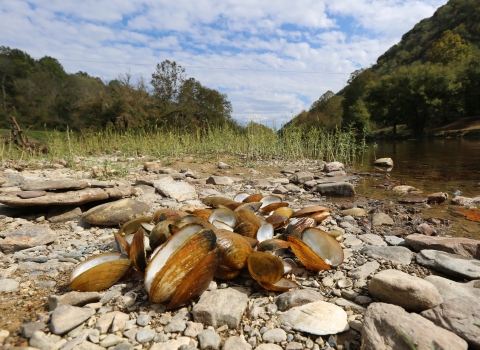What We Do
Fish Health Inspections
Established in 1962, the La Crosse Fish Health Center serves as the region’s fish doctors. We provide fish health inspections and diagnostic services to national fish hatcheries in Wisconsin, Missouri, and Ohio. Like all animals, fish are susceptible to a variety of environmental, nutritional, and infectious diseases. If left untreated, these diseases can often lead to death. Infectious diseases, those caused by pathogens - organisms such as parasites, bacteria or viruses - are of special concern because they can be easily spread to other fish within a hatchery, to another hatchery during fish transfers, or to wild populations if infected fish are released.
.
National Wild Fish Health Survey
The center supports the health of wild fish populations by participating in the National Wild Fish Health Survey where they monitor wild populations for fish pathogens. The information collected by the National Wild Fish Health Survey helps biologists and fisheries managers decide where and how to manage aquatic animals and to model for future pathogen occurrences. This data can help to establish safe zones and areas where movement of aquatic animals can take place without endangering the health of wild fish populations.
Leadership in Regional Fish Health
The center provides technical assistance to state, tribal and federal agencies, addresses emerging pathogen issues through applied research and innovative management strategies, conducts research on fish pathogen management and control, provides training to fish biologists and provides community outreach.
.
Diagnostics
One essential part of keeping populations healthy is a diagnosis whenever signs of pathogens are present. The La Crosse Fish Health Center provides diagnostics for fish, freshwater mussels, and amphibians. At the center, we identify, diagnose, and suggest treatment options for various health problems to reduce losses.
Our Services
The Bacteriology Laboratory
Uses traditional technology to grow and identify bacteria that are present in the organism.
The Molecular Laboratory
Uses genetics with DNA and RNA to confirm and identify aquatic animal species and pathogens.
The Parasitology Laboratory
Assess the type and numbers of parasites present, including the spores found in the cartilage of young salmonids that result in “whirling disease.”
The Virology Laboratory
Uses cell lines derived from several species of fish to culture viruses.
The Fish Surrender Program
The La Crosse Fish Health Center offers a free and humane option for euthanizing fish that can no longer be cared for. By choosing this method, you help prevent the introduction of aquarium fish into our rivers and lakes, which is crucial for maintaining healthy ecosystems and protecting against invasive species invasive species
An invasive species is any plant or animal that has spread or been introduced into a new area where they are, or could, cause harm to the environment, economy, or human, animal, or plant health. Their unwelcome presence can destroy ecosystems and cost millions of dollars.
Learn more about invasive species . This service is available to the surrounding La Crosse area.
Learn more here: Fish Surrender Program
Our Projects and Research
Across the country, scenes of thousands of freshwater mussel shells scattered on the banks and bottoms of lakes and rivers haunts scientists. For the most part these mussel die-offs are unexplained and mysterious. Pollution and contaminants are a well known cause of mortalities but in the case of these die-offs there were no contaminants found....


